
When Kamala Harris was picking her running mate this summer, Tim Walz’s characterization of J.D. Vance and Donald Trump as “weird” in a series of TV interviews helped earn him his spot on the ticket. In the weeks that followed, Republicans turned the insult on the Minnesota governor, accusing him of being a bit of a weirdo himself. (Their pretty flimsy case is based on Walz’s sometimes exuberant body language.)
But last night’s debate between Vance and Walz was surprisingly, almost disconcertingly, normal.
What was the third and, almost surely, the final debate of this presidential race was a far cry from the previous two. The first ended Joe Biden’s career. The second was a bizarre, bad-tempered spectacle in which Trump lost his cool—and then just lost. Last night was a return to something more familiar.
On even some of the most contentious issues in American politics—including abortion and immigration—Vance and Walz clashed in ways that were serious, detailed, policy-focused, and even polite. (You did the Midwest proud, fellas!) I’m pretty sure I heard the words “I agree with. . . ” or “I actually agree with. . . ” multiple times. “I’ve enjoyed this debate,” said Walz toward the end of proceedings. “There’s been a lot of commonality.” Okay, maybe it was getting a little too normal.
Like the previous two debates, this one had a clear winner: J.D. Vance. The 40-year-old Ohio senator arrived at the CBS studio with a clear plan: to tie Kamala Harris to the status quo and contrast the Biden-Harris years with the Trump years, especially on the economy and foreign policy. That has always been Trump’s best pitch to voters, albeit one the former president has been unable to stick to. Last night, Vance showed the discipline and clarity his boss lacks—and he reminded those watching of the political talent that got him to that stage.
As for Walz, he and his party had managed expectations ahead of the debate by admitting that the Minnesota governor was “nervous.” And that wasn’t spin. Walz seemed unsure both of himself and the message he wanted to communicate to voters. But if Walz seemed muddled, then so does the Harris campaign. Does she want to capitalize on the purported success of the Biden administration, or be the change candidate? She doesn’t seem to know, so it’s no surprise Walz doesn’t either.
Walz’s worst moment came when he was asked about a lie he was recently caught in over his trips to China and Hong Kong. (Walz said he was in Hong Kong during the Tiananmen Square massacre. He was actually in Nebraska.) “I’m a knucklehead at times,” he said during a long, rambling answer.
When Harris interviewed Walz for the spot on the ticket, he reportedly warned her that he was a “bad debater.” Based on last night’s performance, that was not false modesty.
This is the point in the analysis where I am duty-bound to inform you that VP debates don’t matter very much. They’re the equivalent of the bonus material on the second DVD that only superfans watch. And most of those superfans have probably made up their minds by now.
But in an abbreviated and close contest, Harris’s one big decision was her running mate. Watching Walz on the debate stage last night, it was hard to see how, exactly, Harris’s choice has boosted her chances of victory in November. And if anyone in the Pennsylvania governor’s residence was watching, they were probably wondering the same thing.
Oliver Wiseman is a writer and editor for The Free Press. Follow him on X @ollywiseman.
This piece was first published in our news digest, The Front Page. To get our latest scoops, investigations, and columns in your inbox every morning, Monday through Thursday, become a Free Press subscriber today:


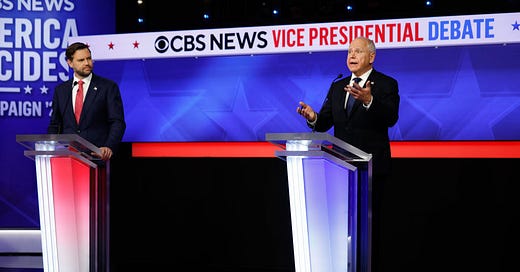



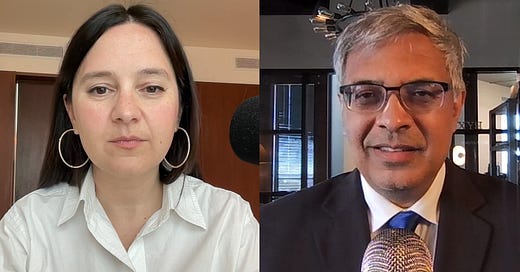



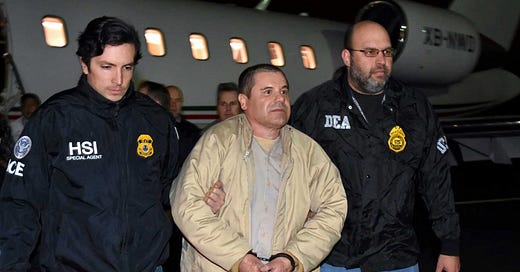

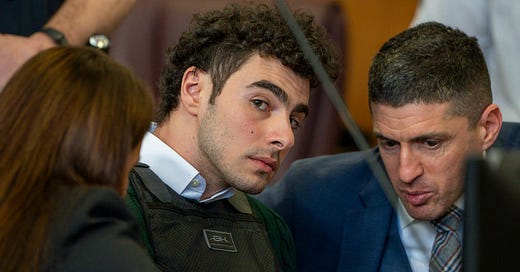

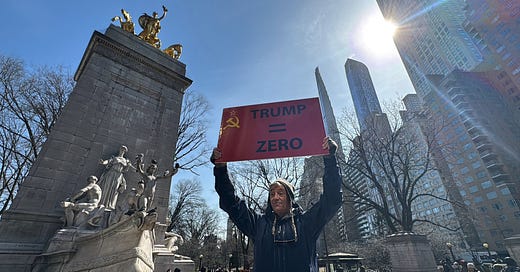
Tim Walz is labeled weird because he: Tampon Tim, Tiananmen Tim, DUI lie, military lie, China lie, his wife enjoys the smell of burning businesses, and more.
I do not like the concept of the federal government having anything much to do with child care, which came up in the debate. The two and three year olds will only be told they can decide their sex - as opposed to reality based sex which is merely "assigned at birth" - based on what toys they pick up, etc. This is regressive.
And, in general, do we really want the Feds to program our babies including against parents? Think Chinese Red Guard.
Already, parents get reported to CPS if they do not go along with a kid's fantasy "Gender Identity". And, the poor kids get removed from loving parents. They cannot be given to foster parents who do not agree with "Gender Identity" - a gnostic belief.
And, look at this one: "Michigan Legislature Creates Tip Line for Students to Turn in Parents for “Improperly Stored Guns”" https://wokespy.com/michigan-legislature-creates-tip-line-for-students-to-turn-in-parents-for-improperly-stored-guns/ Nothing could go wrong there! Turn our folks (not folx) in and get love bombed! They didn't give me candy or a smart phone! "Listen" to the children.